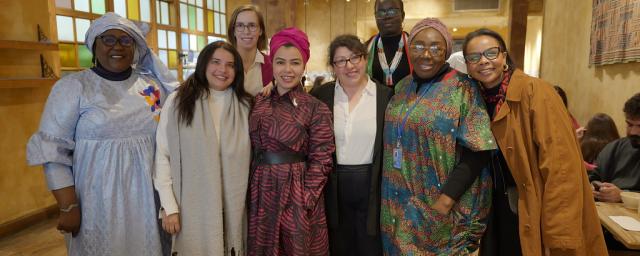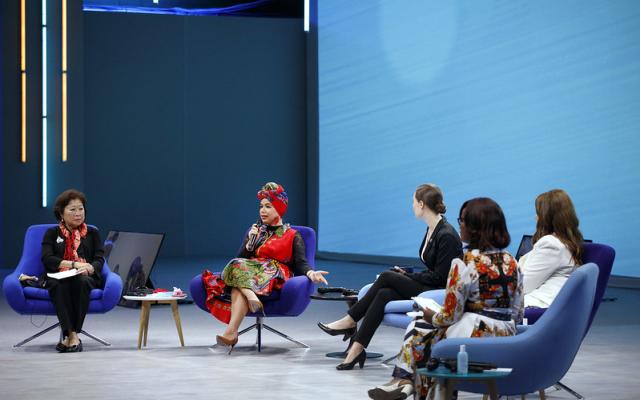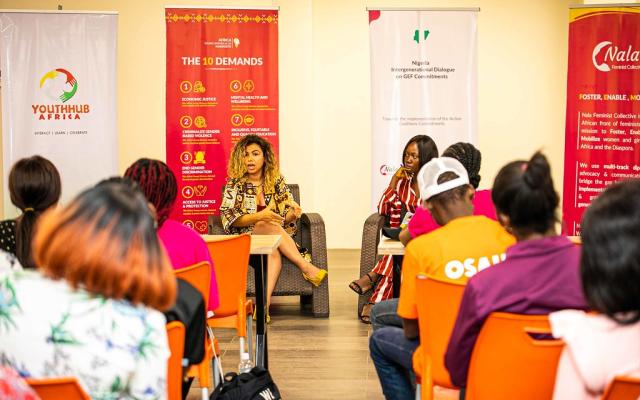
Photo courtesy of Nalafem
The story of Nalafem is one of defiance, persistence, and imagination. Born out of the urgency of the Africa Young Women Beijing+25 Manifesto and propelled onto the global stage at the Generation Equality Forum, Nalafem represents more than an organization it is a movement reclaiming space, power, and voice for young African women. From the halls of the African Union to the corridors of the UN, young feminists have pushed back against tokenism, forged intergenerational alliances, and demanded accountability for bold commitments on gender justice. Aya Chebbi traces that journey, situating it within the wider history of feminist movements, and envisions a feminist multilateralism where young women do not merely participate, but lead.
Nalafem’s Journey: Turning Youth Demands into Feminist Power
When we launched Nalafem at the Generation Equality Forum (GEF) in Paris in July 2021, we carried the weight of young women's aspirations on our shoulders. Nalafem was not yet a registered organization, it was an energy, a commitment, a refusal to let the Africa Young Women Beijing+25 Manifesto collect dust on some UN shelf like so many youth statements before it.
Our journey into multilateral spaces began long before GEF. It began in the corridors of the African Union, at the Commission on the Status of Women (CSW), in youth symposiums where “youth inclusion” meant your name on the attendance list but not on the decision-making table. It began in those rooms where resolutions were adopted without youth input. It began in the lived realities of young women facing pandemics, unemployment, unequal care workloads, gender-based violence, and the digital divide while hearing speeches about “empowerment” that did not translate into change.

Photo courtesy of Nalafem
In 2020, at the peak of the pandemic, Africa Young Women Beijing+25 Manifesto (AYWB+25 Manifesto) developed in consultation with 1,500 African youth from 44 countries and over 30 partners across five Regional Barazas, under the mandate of the first ever African Union Special Envoy on Youth. The AYWB+25 Manifesto is a groundbreaking feminist political document that sets out critical issues of concern for young women in Africa and makes demands for addressing them. The B+25 Manifesto was handed over during Africa Young Women Beijing+25 High-Level Intergenerational Dialogue on 25 November 2020, by Aya Chebbi to Amb. Delphine O (Secretary General of the Generation Equality Forum), Bineta Diop (Former African Union Special Envoy on Women, Peace and Security), and Phumzile Mlambo-Ngucka (Former Executive Director of UN Women).
Therefore, GEF was a pivot point with the adoption of AYWB+25 Manifesto by the African Union, the collection of over 10,000 signatures, and the inclusion of 8 out of the 10 demands of the Manifesto in the Action Coalitions commitments and the Women, Peace and Security and Humanitarian Action Compact.
We wanted co-creation, co-leadership, and co-governance. We wanted to FEM: Foster, Enable and Mobilize, a generation of young African women leaders who could bridge grassroots realities with intergovernmental policy spaces, and who would refuse to be tokens in anyone’s photo op.
The AYWB+25 Manifesto was born in a crisis. COVID-19 had not only stalled progress on gender equality, it had exposed the fragility and elitism of multilateral systems. The 10 Demands are namely: Economic Justice, Criminalizing Gender-Based Violence (GBV), Ending Gender-Based Discrimination, Access to Justice and Protection, Sexual and Reproductive Health and Rights (SRHR), Mental Health and Well-Being, Inclusive Equitable and Quality Education; Digital Justice, Silencing the Guns and Intergenerational Co-Leadership.

Photo courtesy of Nalafem
Our demands were unapologetic, especially calls for ending unpaid labor and gender-based violence, securing comprehensive SRHR, including abortion rights as well as providing mental health care and digital protections while institutionalizing co-leadership in political decision-making.
Following the adoption of the Manifesto, Nalafem worked with feminists to hold governments and the multiple stakeholders accountable to their GEF commitments, especially to financing young women organizations to deliver these commitments.
Four years later, young feminists are not just making demands, they are writing laws, leading ministries, running for office, and occupying the space they deserve. We have moved from the politics of inclusion to the politics of ownership. Energized by Gen Z and in the continued spirit of bridging past and present generational divides, the work of Nalafem has been enhanced to take bolder steps and strategies.
However, in every multilateral space from the UN General Assembly to the Commission on the Status of Women, the barriers facing young women remain stubbornly familiar. Too often, invited for visibility rather than influence, young feminists' presence valued for optics, but excluded from actual decision-making. Commitments to gender equality are made in high-level halls, limited enforceable accountability, allowing governments and institutions to speak boldly while acting timidly.
Engagement continues to be concentrated in capital cities especially New York and urban centers, leaving refugee women, rural activists, and those without access to travel, visas or technology systematically excluded from the conversation. Even when young feminists claim space, they face backlash. Offline, this takes the form of event disruptions, intimidation, and harassment. Online, it manifests in coordinated attacks, digital abuse, and even the sabotage of virtual meetings.
Yet, despite these entrenched challenges, progress is not absent. More governments are beginning to recognize young women as experts, feminist funds emerged to support youth-led organizations, and sustained advocacy has secured incremental structural reforms. But for grassroots feminists on the frontlines, progress that is “slow” is not neutral, it is a delay that costs lives, erodes trust, and risks losing entire generations to cycles of exclusion.
Feminist Movements Across Generations: Reclaiming Memory, Shaping Solidarity
We have engaged in conversations with the senior women who led the Fourth World Conference on Women in Beijing. Something that has remained consistent, which we write about in a chapter titled “The Journey to Gender Equality: Mapping the Implementation of the Beijing Declaration and Platform for Action,” published by the University for Peace, is that the memory of African women leading multilateral processes over the years gets erased or overwritten with generalized language of ‘all women's success.’ This erasure of efforts and impact has consistently fed into the othering and marginalization of Africa and African women from formal multilateral negotiations, relegating them in side events.
In Beijing, African women were not only at side events, they were in government delegations, influencing text, securing commitments. Today, we see more African women confined to civil society delegations without decision-making power.
The rise of digital tools has made it easier for African women to strategize across borders, connect movements, and secure seats in established advocacy spaces such as NGO CSW, the Women’s Major Group, and the Women’s Rights Caucus. These gains reflect the legacy of past movements that fought to ensure African women’s presence in global feminist coalitions. Yet, while these spaces were built for collective advocacy, many have become heavily gatekept and overly technical. The specialized language, procedural complexity, and resource demands now act as barriers, effectively locking out grassroots groups and young feminist organizations whose voices and experiences are essential to shaping truly inclusive gender justice agendas.
In conversations with the senior women leaders of the Beijing conference, we hear vivid stories of the deep transnational solidarity that once bound women from Africa, Latin America, and Asia together. They remind us that in Beijing, alliances were forged across continents with a shared clarity of purpose. Today, despite unprecedented access to digital tools, movements within the Global Majority have never been so fragmented. Regional blocs often work in isolation, with cross-regional engagement happening more readily with the Global Minority than with each other. This disconnection is not accidental, it is reinforced by funding models that privilege Global Minority–Global Majority partnerships, while neglecting to invest in the South–South alliances that once formed the backbone of global feminist solidarity.
Feminist solidarity is the result of deliberate choices, shared political commitments, and a refusal to let geography, language, or identity divide us. Across movements and regions, certain strategies have proven essential in sustaining this solidarity over time.
At the heart of it is intergenerational co-leadership. Solidarity deepens when elders and younger feminists exchange stories and share power in shaping strategies, influencing policy, and leading convenings. In Nalafem, this has meant inviting Beijing veterans like Gertrude Mongella and Achola Pala to strategize alongside Gen Z leaders, ensuring that historical memory fuels bold, contemporary tactics.
A second pillar is shared political frameworks. Tools like the Africa Young Women Beijing+25 Manifesto and FEM (Foster, Enable, Mobilize) have provided a common language and vision that unite activists across countries. These frameworks make it possible to hold governments accountable to agreed priorities while allowing for adaptation to local realities.
Solidarity also depends on participatory and inclusive organizing. This means moving beyond statements crafted in elite circles to create processes that center rural women, refugee leaders, and democracy activists as co-authors of the agenda. Barazas, feminist assemblies, and grassroots consultations have been critical spaces where ownership is built from the ground up.

Photo courtesy of Nalafem
Pan-African and transnational convenings such as the annual Nalafem Summit that we convene on GEF anniversary, act as political homes where activists can strategize outside donor-driven agendas. Historically, spaces like Beijing in 1995 showed us the power of meeting face-to-face to share tactics, build trust, and resist divide-and-conquer politics.
Digital tools have made these connections easier, but solidarity only lasts when online exchanges lead to concrete collaboration. This means transforming hashtags into joint campaigns, cross-country advocacy missions, and coordinated policy pushes that produce tangible change.
Finally, solidarity is sustained when movements resist fragmentation through cross-movement alliances connecting feminist struggles to climate justice, anti-racism, Indigenous rights, and labor rights and when funding models support Global South–led collaboration rather than dividing resources along narrow program lines.
In essence, feminist solidarity is a political practice. It is sustained by trust, strategy, and the understanding that our liberation is bound together across continents, generations, and struggles.
Defending Gains, Fighting Back: African Young Feminists Confront Global Anti-Rights Backlash
This year’s Beijing+30 Political Declaration was a bitter reminder that the backlash is organized, global, and well-funded. The deliberate omission of SRHR erasing abortion rights and bodily autonomy was not just a policy gap or a technical oversight, it was a political signal that our bodies remain negotiable currency in global diplomacy. It emboldens anti-rights actors and undermines decades of advocacy on access to contraception, safe abortion, and comprehensive sexuality education. It forces us to recalibrate: defending past gains while mobilizing to prevent further erosion. It reinforces the need for movements to operate beyond event-based advocacy, embedding SRHR demands in national laws, budgets, and grassroots mobilization, not just UN declarations.
For African young feminists, this was not abstract. It meant a green light for anti-gender laws to multiply across borders. We have learned that one regressive law passed in one country will almost certainly be replicated in another. The anti-gender movement is strategic, our response must be more so.
In global spaces, feminist actors face exclusion from negotiations, intimidation at events, and increasing digital attacks. Online harassment is no longer incidental, it is a deliberate strategy to silence and exhaust feminist voices.
That is why Nalafem invests in political allyship: training and supporting women in politics to hold the line inside the government and against regressive policies. In The Gambia, this strategy was instrumental for young feminists in defending the FGM ban. Our annual Nalafem Summit is co-hosted with governments to make the walls between state and feminist movements more porous and to remind elected leaders they are answerable to a living, organized movement. We built a political network that keeps feminist leaders connected to grassroots movements and accountable to them.
Revitalizing CSW: Young Feminists Demanding Real Power
For many young feminists, CSW is a networking week, a place to meet funders, host side events, and gather with peers. But the true power of CSW lies in the Agreed Conclusions and in holding governments accountable for them. Too often, young feminists have been trapped outside the official space, while negotiations happen without youth voices. CSW revitalization has been a topic in all the side events for years and several organizations have submitted recommendations. Nalafem submitted a statement with seven recommendations to:
- Institutionalize permanent youth seats within Member State delegations
- End the erasure of North African feminists by classifying with African, not only MENA/SWANA movements.
- Integrate grassroots and indigenous feminist groups into formal CSW structures
- Require pre-CSW government–civil society dialogues to co-design agendas
- Publicly track government compliance with Agreed Conclusions year-round
- Decentralize CSW and host it in Global South
These are not radical asks. They are the bare minimum for a system that claims to be inclusive.
Learning from the Past, Leading with Power: The Future of Feminist Multilateralism
The multilateral system must move beyond tokenistic inclusion and institutionalize mechanisms and processes that guarantee co-leadership, representation, and accountability. This includes formalizing youth and feminist representation in Member State delegations, dismantling regional classifications that erase African feminist agency and impact. Move away from only engaging civil society in event based organizing and have processes for engagement in negotiations and policy formulation.
Our vision for the future is a feminist multilateralism rooted in intersectionality, decolonization, solidarity, and co-leadership.
It is a multilateralism where young feminists don’t just attend panels, they chair committees, draft resolutions, secure budgets, and lead institutions. They engage in year-round engagement in negotiations and policy formulation, not just at events.
We have inherited the courage of the women who built Beijing in 1995. We owe it to them and to the next generation to make sure no declaration or platform for action becomes another archive of broken promises. The future we fight for is one where feminist leadership is not symbolic, but sovereign.
Aya Chebbi is the Founder of Nalafem, one of Africa’s largest multigenerational alliances of women politicians and activists united towards transformative feminist change. She is a Pan-African feminist and diplomat whose mission is the liberation of African women and girls. Aya served as the first ever African Union Special Envoy on Youth and the youngest diplomat at the Chairperson’s Cabinet (2018 – 2021).